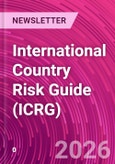ICRG remains one of a dozen firms, worldwide, to supply Transparency International (TI) with corruption scores that help inform the organization’s annual Corruption Perceptions Index. Our data partnership with TI dates some 20 years.
International Country Risk Guide is one of the world's best commercial sources of country risk analysis and ratings. Updated monthly, ICRG monitors 141 countries. Each 200+ page issue provides financial, political, and economic risk information and forecasts. ICRG's statistical tables assign values to the over 30 indicators underlying ICRG's business-oriented model for quantifying risk, examining such country-specific elements as currency risk, political leadership, the military and religion in politics, and corruption.
Your online subscription to ICRG will include a subscription to INVESTIR: Monthly Insights from the International Country Risk Guide.
Beginning in 1980 as International Reports, a well-known emerging markets newsletter, the International Country Risk Guide (ICRG) has become the world’s ‘most authoritative,’ quant- driven geopolitical risk rating and forecasting series.
Now covering 141 developed, emerging, frontier countries and offshore financial centers, ICRG presents monthly political, economic, financial and composite risk ratings and forecasts.
From risks presented by government instability, the threat of asset expropriation, transfer and payment delays, to forms of internal conflict, terrorism, and corruption, ICRG has been labelled ‘a vital source for managing and advising investment funds that focus on volatile countries, both emerging and developed.’
Monthly updates include 27 tables of economic and financial data affecting metrics most relevant to assessing the risk to commercial assets and related items. From growth, to inflation, to current account and fiscal balances; from external debt/GDP, debt servicing to exports, liquidity and currency stability.
Used by the world’s largest institutional investors, multilateral organizations, transnational firms, central banks, and sovereign wealth funds, ICRG is also the most widely used source of risk data by universities throughout the world.
Indeed, the publication list in scholarly and trade journals using ICRG is unparalleled, with findings no other geopolitical risk firm can match.
Traders and portfolio managers, with trillions in assets under management, use ICRG’s ratings and risk metrics to allocate country exposure as the data have been shown to be predictive of equity market returns. Transnational firms and others use ICRG for risk management given its predictive capacity for future risk events.
The ICRG is a proven early warning system.
Moreover, ICRG is the only political risk methodology and data series to be accepted by the courts in commercial disputes involving the valuation of political risk.
Purchasing a subscription to ICRG provides access to the current month’s ICRG data, as well as 12-months of back data.
Additionally, you will receive access to written analysis for all 141 countries covered by the ICRG. This written analysis include a summary of the current political, economic, and financial state of the country, and are an obvious compliment to the ICRG data.
Table of Contents
OVERVIEW
- A note from Christopher McKee, PhD, Executive Chairman of the International Country Risk Guide (ICRG)
PART ONE: INTELLECTUAL FOUNDATIONS & OUR HISTORY
PART TWO: THE INTERNATIONAL COUNTRY RISK GUIDE
PART THREE: A MORE GRANULAR LOOK AT THE ICRG METHODOLOGY
THE POLITICAL RISK RATING
THE ECONOMIC RISK RATING
THE FINANCIAL RISK RATING
THE COMPOSITE RISK RATING
RISK FORECASTS
Countries Covered
- Albania
- Algeria
- Angola
- Argentina
- Armenia
- Australia
- Austria
- Azerbaijan
- Bahamas
- Bahrain
- Bangladesh
- Belarus
- Belgium
- Bolivia
- Botswana
- Brazil
- Bulgaria
- Burkina Faso
- Cameroon
- Canada
- Chile
- China
- Colombia
- Congo
- Congo DR
- Costa Rica
- Cote d’Ivoire
- Croatia
- Cuba
- Czech Republic
- Denmark
- Dominican Republic
- Ecuador
- Egypt
- El Salvador
- Estonia
- Ethiopia
- Finland
- France
- Gabon
- Gambia
- Germany
- Ghana
- Greece
- Guatemala
- Guinea
- Guinea-Bissau
- Guyana
- Haiti
- Honduras
- Hong Kong
- Hungary
- Iceland
- India
- Indonesia
- Iran
- Iraq
- Ireland
- Israel
- Italy
- Jamaica
- Japan
- Jordan
- Kazakstan
- Kenya
- Korea, D.P.R.
- Korea, South
- Kuwait
- Latvia
- Lebanon
- Liberia
- Libya
- Lithuania
- Luxembourg
- Madagascar
- Malawi
- Malaysia
- Mali
- Malta
- Mexico
- Moldova
- Mongolia
- Morocco
- Mozambique
- Myanmar
- Namibia
- Netherlands
- New Zealand
- Nicaragua
- Niger
- Nigeria
- Norway
- Oman
- Pakistan
- Panama
- Papua New Guinea
- Paraguay
- Peru
- Philippines
- Poland
- Portugal
- Qatar
- Romania
- Russia
- Saudi Arabia
- Senegal
- Serbia
- Sierra Leone
- Singapore
- Slovakia
- Slovenia
- Somalia
- South Africa
- Spain
- Sri Lanka
- Sudan
- Suriname
- Sweden
- Switzerland
- Syria
- Taiwan
- Tanzania
- Thailand
- Togo
- Trinidad & Tobago
- Tunisia
- Turkey
- Uganda
- Ukraine
- United Arab Emirates
- United Kingdom
- United States
- Uruguay
- Venezuela
- Vietnam
- Yemen
- Zambia
- Zimbabwe








